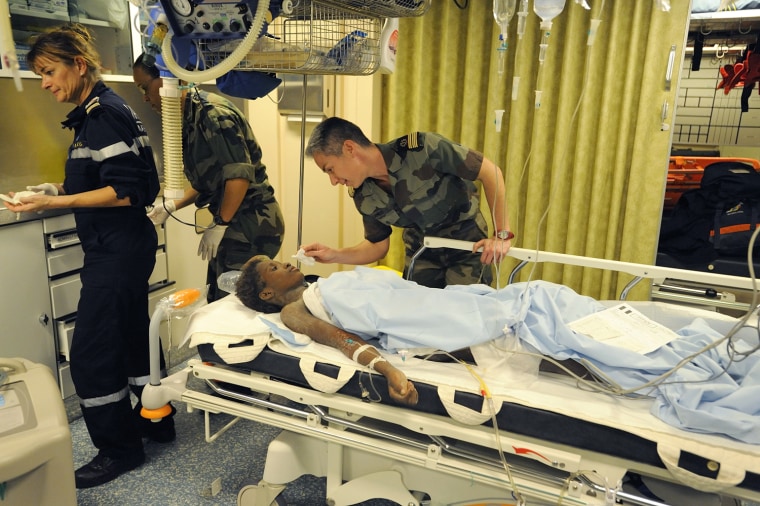She is amazing her doctors, the 16-year-old choir girl who came close to dying but wouldn't in the crumbled concrete graveyard of Port-au-Prince.
More than two weeks after the earthquake brought down her school — and a day after she was lifted from the ruins — Darlene Etienne was eating yogurt, talking and regaining her strength Thursday.
"We are very surprised at the fact that she is still alive," said Dr. Evelyne Lambert, who is caring for her on a French hospital ship offshore.
One who didn't seem surprised was the girl's mother, a poor rice-and-vegetable peddler.
"I never thought she was dead," Kerline Dorcant, 39, told The Associated Press. "I always thought she was alive."
Why?
"It's God" hearing a mother's nonstop prayers, she said.
Added Darlene's younger brother, Preslin: "I think she has a special God."
Joy amid grief
The astonishing rescue of the high school student, by a French search team that refused to go home when others did, offered a moment of joy in this grieving city, where uncounted thousands were entombed in a landscape of broken and heaped-up concrete, wood and metal.
They're among an estimated 200,000 quake dead in Haiti, including 150,000 who Haitian officials say have been buried anonymously in mass graves.
The U.S. Army's bulldozers were digging into that rubble Thursday, knocking down shaky walls and beginning to clear away ruins in Port-au-Prince, where perhaps 90 percent of the buildings were destroyed or damaged in the Jan. 12 quake.
Just a block away, looters armed with sledgehammers were smashing away at what was left of shops on Rue de Cesar, making off with everything from candy to perfume.
Among tens of thousands of survivors, desperation has grown daily as a huge global relief effort has run into bottlenecks in air, sea and road transport, with looting and other security problems disrupting mass food handouts. Coordination remained a problem, leaving big gaps in food distribution.
The U.N. World Food Program says it has delivered more than 4 million rations, equivalent to more than 13 million meals, to some 500,000 people. But it projects that 2 million Haitians need food aid — now and until December.
Some 1 million quake-displaced people, surviving now beneath plastic sheets, cardboard, blankets or other skimpy covering in city streets and plazas, also need 200,000 family-size tents as a short-term shelter solution, international experts say.
The International Organization for Migration, responsible for internally displaced people worldwide, had only 10,000 tents in Haiti before the quake and is urgently trying to bring in more.
"The needs continue to outweigh the response," the U.N. humanitarian office said.
'A very strong lady'
Darlene Etienne was pulled from the rubble of her cousin's off-campus house Wednesday near the ruins of the St. Gerard school. She was rushed to a French field hospital and then to the hospital ship Siroco.
"At the very beginning, she was in very poor condition, but now she has been stabilized," Lambert said, telling the AP that Darlene was drinking water and had eaten yogurt and mashed vegetables. She estimated her chance of survival at 90 percent.
"Darlene is a very strong lady," her older brother, Preslin, 18, told the AP. And, he added, "very smart at school."
Darlene, the middle child of three, had left her family for the first time just nine days before the magnitude-7.0 earthquake, traveling from Marchant Dessalines, their hometown north of the capital, to live with her cousin and his wife while attending high school.
The quake trapped unknown numbers of students and staff in collapsed school buildings, hostels and nearby homes. Among the victims was the wife of Darlene's cousin, crushed by a falling wall in the back of their house. Making his way home from his office, the cousin saw the destruction and believed both were lost.
But on Wednesday — 15 days later — neighbors heard a voice weakly calling from the rubble and alerted authorities, who brought in the French rescue squad.
"They should not have been working anymore," said French Ambassador Didier le Bret. The Haitian government had declared an end to the search phase, but the French team was stubborn. "They felt that some lives still are to be saved," he said.
The team's Dr. Claude Fuilla walked along the house's crumbled roof, heard a voice and, clearing away debris, spotted the buried girl's head. The team dug a hole to give her oxygen and water, and within 45 minutes they managed to remove her.
"She was in very bad shape," Fuilla said.
Rare case of survival
Lambert expressed amazement at her survival, saying it seemed to defy "biological facts." Neighbors said they believed she was trapped in a shower room and may have gotten to water. Rescuers said she mumbled something about having a little Coca-Cola with her in the rubble.
Such long-term survivals are extremely rare but not unheard of — even up to two weeks.
"There is no firm rule," said Dr. Andrew Pollak, en route to Haiti with his team of University of Maryland Medical Center trauma experts.
"Assuming you were very hydrated beforehand, people can probably go a couple of weeks," he said.
Randall Packer, a biology professor at George Washington University and an expert on salt and water balance, said Darlene's youth was "definitely on her side because we're all a lot tougher at that age."
In blue sandals, white skirt and a pink sweater, Darlene's mother waited patiently to be taken by helicopter Friday to the French ship to be reunited with her. Meanwhile, they spoke by satellite phone.
"I'm going to come, my dear. I'm going to come," Dorcant kept saying, apparently responding to Etienne's pleas. "How are you feeling? Does it hurt?"
She then passed the phone to others with visible relief. "At last I'll be able to sleep."
On the nightmarish streets of Port-au-Prince, the French rescuers were out again Thursday, in their continuing, improbable search for lives to save.
